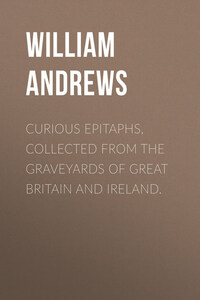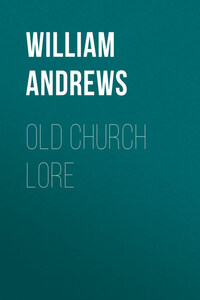For many years I have collected curious epitaphs, and in this volume I offer the result of my gleanings. An attempt is herein made to furnish a book, not compiled from previously published works, but a collection of curious inscriptions copied from gravestones. Some of the chapters have appeared under my name in Chambers’s Journal, Illustrated Sporting and Dramatic News, Newcastle Courant, People’s Journal, (Dundee), Press News, and other publications. I have included a Bibliography of Epitaphs, believing that it will be useful to those who desire to obtain more information on the subject than is presented here. I have not seen any other bibliography of this class of literature, and as a first attempt it must be incomplete. In compiling it I have had the efficient aid of Mr. W. G. B. Page, of the Hull Subscription Library, who has also prepared the Index.
I must tender my thanks to the following friends for their valued assistance: Mrs. Geo. Linnæus Banks, author of the “Manchester Man,” Mr. W. G. Fretton, F.S.A., Mr. Walter Hamilton, F.R.G.S., Mr. Jno. H. Leggott, F.R.H.S., Rev. R. V. Taylor, B.A., Mr. H. Vickery, and others whose names appear in the following pages.
In conclusion, I hope that this book will merit from readers and reviewers a similar welcome to that granted to my former works; in that case I shall have every reason to be satisfied with my pleasant labour.
WILLIAM ANDREWS.
Hull Literary Club,
EPITAPHS ON PARISH CLERKS AND SEXTONS
Amongst the most curious of the many peculiar epitaphs which are to be found in the quiet resting-places of the departed are those placed to the memory of parish clerks and sextons. We have noted at various times, and at different places, many strange specimens, a few of which we think will entertain our readers.
In the churchyard of Crayford is a grave-stone bearing the following inscription: —
Here lieth the body
OF
Peter Isnell,
Thirty years clerk of this Parish
He lived respected as a pious and mirthful man, and died on his
way to church to assist at a wedding,
On the 31st day of March, 1811,
Aged 70 years
The inhabitants of Crayford have raised this stone to his cheerful
memory, and as a tribute to his long and faithful services
The life of this clerk, just three score and ten,
Nearly half of which time he had sung out “Amen;”
In youth he was married, like other young men,
But his wife died one day, so he chanted “Amen.”
A second he took, she departed – what then?
He married and buried a third with “Amen.”
Thus his joys and his sorrows were treble, but then
His voice was deep bass, as he sung out “Amen.”
On the horn he could blow as well as most men;
So his horn was exalted to blowing “Amen.”
But he lost all his wind after three score and ten,
And here, with three wives, he awaits till again
The trumpet shall rouse him to sing out “Amen.”
In addition to being parish clerk, Frank Raw, of Selby, Yorkshire, was a grave-stone cutter, for we are told: —
Here lies the body of poor Frank Raw,
Parish clerk and grave-stone cutter,
And this is writ to let you know
What Frank for others used to do,
Is now for Frank done by another.
The next epitaph, placed to the memory of a parish clerk and bellows-maker, was formerly in the old church of All Saints, Newcastle-on-Tyne: —
Here lies Robert Wallas,
The King of Good Fellows,
Clerk of All-Hallows,
And maker of bellows.
On a slate head-stone, near the south porch of Bingham Church, Nottinghamshire, is inscribed: —
Beneath this stone lies Thomas Hart,
Years fifty eight he took the part
Of Parish Clerk: few did excel.
Correct he read and sung so well;
His words distinct, his voice so clear,
Till eighteen hundred and fiftieth year.
Death cut the brittle thread, and then
A period put to his Amen.
At eighty-two his breath resigned,
To meet the fate of all mankind;
The third of May his soul took flight
To mansions of eternal light.
The bell for him with awful tone
His body summoned to the tomb.
Oh! may his sins be all forgiv’n
And Christ receive him into heav’n.
In the same county, from the churchyard of Ratcliffe on Soar, we have a curious epitaph to the memory of Robert Smith, who died in 1782, aged 82 years: —
Fifty-five years it was, and something more,
Clerk of this parish he the office bore,
And in that space, ’tis awful to declare,
Two generations buried by him were!
In a note by Mr. Llewllynn Jewitt, F.S.A., we are told that with the clerkship of Bakewell church, the “vocal powers” of its holders, appear to have been to some extent hereditary, if we may judge by the inscriptions recording the deaths and the abilities of two members of the family of Roe which are found on grave-stones in the churchyard there. The first of these, recording the death of Samuel Roe, is as under: —
To
The memory of
Samuel Roe,
Clerk
Of the Parish Church of Bakewell,
Which office
He filled thirty-five years
With credit to himself
And satisfaction to the Inhabitants
His natural powers of voice,
In clearness, strength, and sweetness
Were altogether unequalled
He died October 31st, 1792,
Aged 70 years










